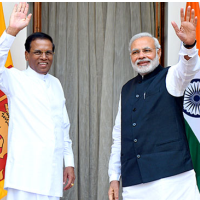Delhi Welcomes New Sri Lankan President With Nuclear Energy, Defence Deals
 Sri Lanka's President Maithripala Sirisena (left) with Prime Minister Narendra Modi in New Delhi on Monday (photo: AFP)
Sri Lanka's President Maithripala Sirisena (left) with Prime Minister Narendra Modi in New Delhi on Monday (photo: AFP)
India has put the Rajapaksa decade firmly behind it with the government sealing a nuclear energy agreement with the new Sri Lanka president Maithripala Sirisena, who is in Delhi on his first trip abroad since winning his country’s election in January.
According to Reuters, Sirisena’s visit has provided Delhi with an opportunity to repair ties that had become tense under his predecessor, Mahinda Rajapaksa.
"The bilateral agreement on civil nuclear cooperation is yet another demonstration of our mutual trust," Prime Minister Narendra Modi said in a statement.
Under the deal, India will help Sri Lanka build its nuclear energy infrastructure, including training of personnel. India could later sell light small-scale nuclear reactors to its southern neighbour, which wants to establish 600 MW of nuclear capacity by 2030, according to sources quoted in the media.
Under the previous Rajapaksa administration, Sri Lanka had pursued closer ties with China which provided economic assistance after the 26-year-civil war ended in 2009.
China built a seaport in the south of Sri Lanka and signed a deal to develop a $1.5 billion port next to the commercial port in Colombo, raising fears in India that Beijing was winning influence in its neighbour.
Indo-Sri Lankan ties worsened further after Rajapaksa allowed Chinese submarines to dock last year. The fact that the India was not intimated in advance, as per an existing agreement, rankled even further.
With the new government pledging to review Chinese infrastructure projects awarded under the Rajapaksa administration, Sri Lanka is expected to follow a more balanced foreign policy that keeps Indian sensitivities in mind.
"This is my first visit and it has given very fruitful results," Sirisena said in Delhi on Monday.
Modi announced that the two countries also agreed to expand defence cooperation, but gave no details.
On the fishermen issue, Modi added, "President and I have attached high importance to the fishermen issue. Fishermen from both regions should meet and share their proposals with the government."
Since coming to power last May, Modi has reached out to neighbours, offering to build power stations and ports, in a bid to push back against China.
In March he will pay a visit to Sri Lanka, where Sirisena had made positive moves towards a fairer treatment of minority Tamils and Muslims in the North and East. Modi is expected to travel to Jaffna during his visit.
The prime minister will then visit the Maldives where Beijing is once again seen to be expanding its diplomatic ties as part of its strategy to build a network of friendly ports in the Indian Ocean, long considered by India as its zone of influence.
- Karan Singh
To Learn More:
India seals nuclear energy pact with Sri Lanka, hopes to push back Chinese influence (by Krista Mahr and Sanjeev Miglani, Reuters)
Agreement on civil nuclear deal sign of trust between India and Sri Lanka, says Modi (Zee News)
Sri Lankan president's India visit: Why Sirisena & PM Modi must look to deepen bilateral ties (by Sreeram Chaulia, Economic Times)
With ‘Act East’ India Begins to Push Back Against China (by Karan Singh, AllGov India)
- Top Stories
- Controversies
- Where is the Money Going?
- India and the World
- Appointments and Resignations
- Unusual News
- Latest News
- India College Chain’s Expansion into U.S. Draws Opposition from Massachusetts Officials over Quality of Education
- Milk Shortages in India Tied to Release of New Movies Featuring Nation’s Favorite Stars
- Confusion Swirls around Kashmir Newspaper Ban in Wake of Violent Street Protests
- Polio-Free for 5 Years, India Launches Vaccine Drive after Polio Strain Discovery
- New Aviation Policy Could Increase Service, Lower Ticket Prices






Comments